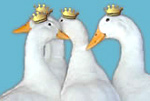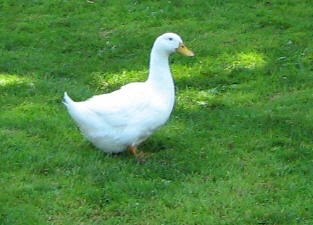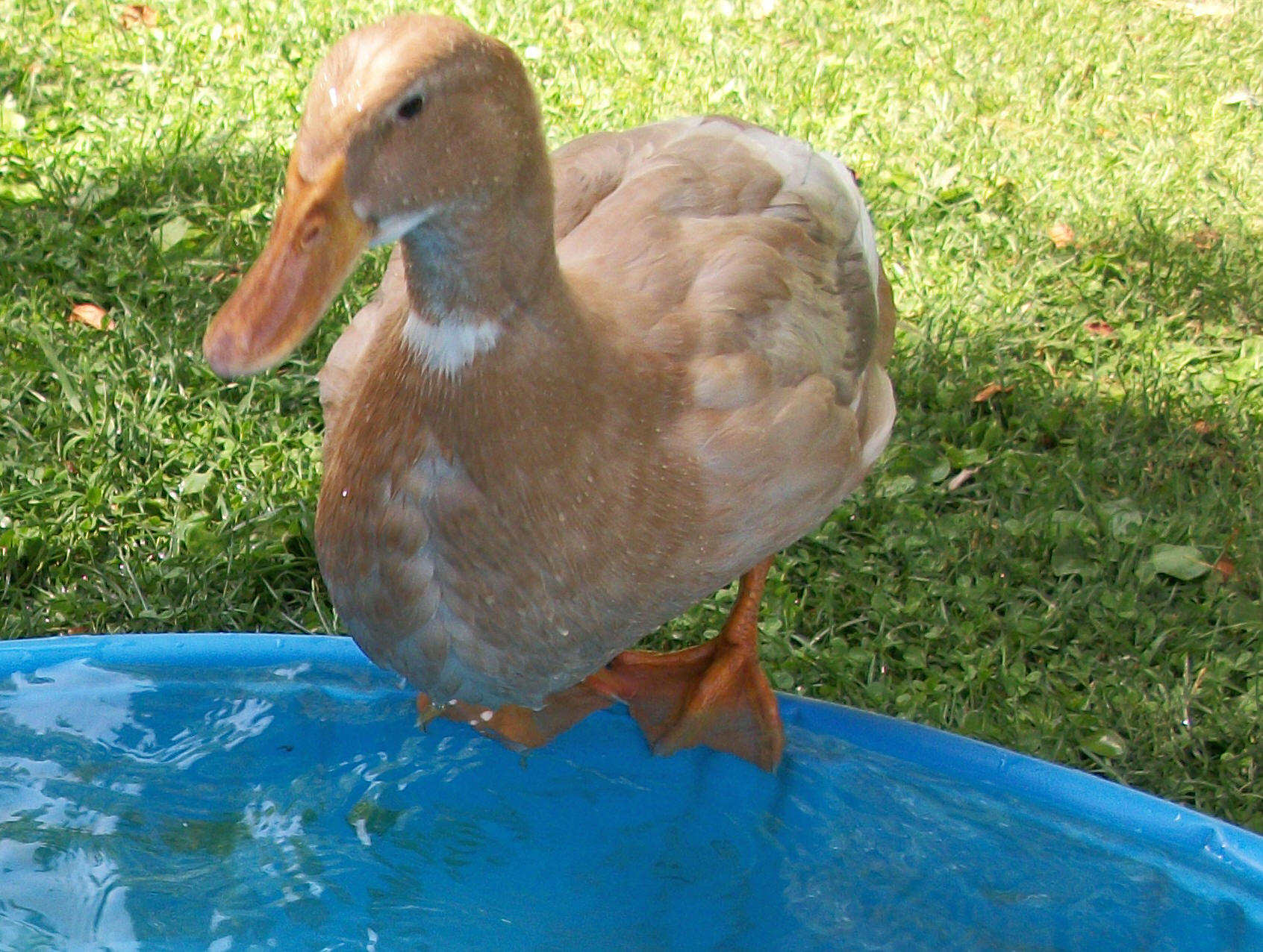Lil "Miz" Bee
We want to thank Everyone who has donated so far to help Lil Ms. Bee with her recent wing surgery. As many of you know, her boyfriend Marvin accidentally broke her wing when getting a bit too amorous with her (he didn't mean to!). But the good news is, she's doing great.
Lil Ms. Bee is staying indoors with us in our sunroom for the next few weeks and has had two positive check-ups since her wing surgery--with another follow-up x-ray scheduled soon.
If you haven't donated yet, please consider doing so. We have another feed order scheduled to arrive at the end of September and the ducky checking account is quite low. We're really trying to avoid dipping into our sanctuary rebuild savings because we have two pens to tear down and rebuild by the end of October in order to stay on track and keep our sanctuary open.
If you can help, please do: Donate. Every bit makes a difference!
Ducky Hero of The Month!
Congrats to Christine of Spokane, WA who was adopted by a duck who wandered into their barn and decided to stick around. They recognized that their new Blue Swede drake "Crackers" was lonely, so they went out and rescued a Khaki Campbell drake from a local pond where he was dropped off and abandoned.
Elvis and Crackers are getting along famously, so happy to have friendship, safety and a family in their lives again!
Thank you Christine & family for making such an amazing difference in the lives of these two precious boys! You are an inspiration!

Elvis (left) and Crackers (right)
A Pair of Boys
We get a lot of emails from homes with single drakes, wanting to know if adopting another drake as a companion is a good option. There are many factors to determining if your male duck will get along with another boy.
Older boys tend to get along better with one another than younger boys who have more energy to invest into competing. Younger drakes also have greater surges of spring hormones, which can also lead to more squabbles.
Boys introduced in the fall/early winter (when hormones are at their lowest) have a better chance of establishing a friendship than those introduced in spring/summer.
Having no females around to compete over usually results in much-reduced fighting. Keep in mind, if either of the boys are human-imprinted, they may compete over attention from YOU! Alternately, adding 2-4 females for every male (enough for everyone) can also reduce competitive fighting--if you have the pen space.
Boys who grow up together sometimes get along better than males introduced later in life, but this is not always the case.
And of course, there’s personality... Calm or lonely drakes tend to get along better with a new friend than secure, energetic drakes who tend to put all their extra pizzazz into wrestling matches.
And let's not forget the nature of different breeds. Certain breeds are sometimes feistier than others. We find that Cayuga drakes are often more steadfast than Pekins. Muscovy ducks don't take no for an answer (and we love that about them!) and Mallards can be relentless despite their smaller size.
And finally… drakes who are the same size usually fight more than a pair comprised of one larger and one smaller drake. This is because the same-sized drakes tend to have greater difficulty establishing and maintaining the pecking order--it's always a competition vying for the top, and each boy has equal opportunity. In situations with one slightly larger and one slightly smaller drake, the bigger boy often has an easier time holding onto his throne.
For example… Our Pekin drake Rilo shares a pen with our huge Muscovy drake Billy-cha. There's no way Rilo's going to start a fight with Billy. There’s no need for pecking order disputes over who’s going to be in charge, clearly it will always be Billy, so the peace is always kept.
A Duck Without a Voice
Is your duck opening their bill, but no sound is coming out? Or perhaps they're suddenly not attempting to quack at all. We have received a couple of emailed questions from different families about this issue recently.
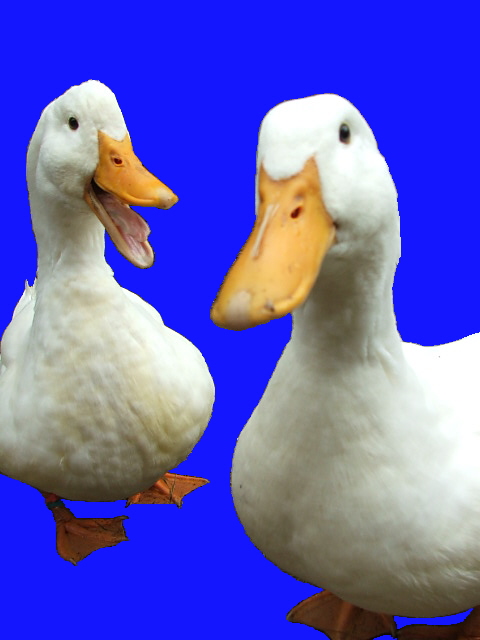
Can
you hear me now?!
If your duck is opening their bill to quack, but nothing’s coming out they may have swallowed something that hurt their throat. Ducks will sometimes swallow a nut or pebble that’s a little too big and it can lead to temporary vocal damage. The worry here is if they did scrape up their throat it might become infected, in which case antibiotics are a good precautionary treatment to preventing further issues or long-term/permanent vocal damage. An anti-inflammatory medication (like Metacam or Rimadyl) for 3-4 days (not too much more or you could potentially risk renal damage) can reduce swelling/pain and help their healing. If this is truly what happened, and they're treated quickly and properly, their voice should start to come back within 1-2 weeks, depending on severity.
You know your duck's environment better than anyone. Take a moment and consider if there’s any chance they may have swallowed an unsafe object (screw, coin, nail, paperclip, etc.). If so, they should have an immediate x-ray done to make sure it isn’t lodged anywhere inside of them, which might lead to further and more serious issues (i.e. hardware disease, zinc poisoning, etc.).
If your duck's not attempting to quack at all, you should not delay in getting them to a vet immediately. This type of symptom can be very severe. Your duck's silence could be a sign that their health is deteriorating from an infection or some other issue entirely. In which case, x-rays, blood work, antibiotics or some other tests/treatments may be in order.
Water Testing Kits
Want to know what your pet ducks and geese are drinking?
Water Test Kit, Lead and Copper (Item # 166946)
Water Test Kit, E. Coli & Coliform Bacteria
(Item # 166945)


Visit: http://www.gemplers.com for ordering information and to view other water testing kits.
A Duck in Drake's Feathers
Many duck owners have noticed one of their female ducks sprouting a drake-like curly tail feather, but does this mean your duck is changing gender? In short, no. So what is going on? First you have to understand a little bit about female duck anatomy.
When a female duck is still in her egg, two sex organs begin to grow, but only when her female genes kick in does one of them develop into a functioning ovary (usually the left one). Meanwhile, in most cases, the other sex organ (usually the right) does not develop at all. It is referred to as an ovotestis or a vestigial, non-functioning ovary. Only rarely does a female duck actually develop two functioning ovaries.
If you have a flock of all female ducks (or a flock with older or injured males who can no longer mate or properly protect their females), it is not unheard of for nature to take over and jumpstart the benign ovotestis in one (or more) of your hens. This switch from utilizing her dominant ovary to using her awakening ovotestis leads to a drop in oestrogen production.
Interestingly, many male characteristics are not determined by male hormones at all, but by the absence of female hormones. Once a female duck no longer produces oestrogen, her body naturally reverts to a default setting of male plumage. In addition, the no longer dormant ovotestis will begin producing androgens. The sudden presence of these hormones in your female duck are responsible for the male traits and behaviors you are suddenly witnessing.
This internal change will lead to your female duck taking on a mock-drake role in the flock. While she will never truly change gender, she will become more protective of the others and even occasionally take on male courtship/mating behaviors. If a drake is later added to the flock, this hen will sometimes revert back to utilizing her dominant ovary and molt her curly tail feather, falling back into her natural place within the flock again.
This reaction to a lack of males is not limited to ducks. Many species of birds experience similar transformations in nature. Female chickens have actually been known to go through vocal changes and begin crowing when there are no roosters around. Rarely, some birds will even change color in addition to behavior to match those of the opposite gender.
Having no males around isn't the only time females will sprout a curly tail feather. It isn't uncommon for older females who are no longer laying eggs to sprout a curly tail feather as their functioning ovary retires. Ducky menopause?!
Keep in mind, it is much more common for females to take on male appearance/behaviors and is usually considered normal/healthy provided that there is a shortage of males and they are compensating for this, OR that they are older, non-layers. On the other hand, when males switch to more female attributes, it is often caused by testicular tumors, which means a visit to the vet would be immediately in order.
If you have a younger female and males are present in your flock and she is still sprouting a curly tail feather, a quick visit to the vet may be in order to determine why her vestigial ovary has suddenly kicked into gear. It can sometimes be a sign of some kind of tumor/growth interfering or damaging her main ovary.
Back in the day, Miri
used to occasionally stop laying eggs and sport
a curly tail feather. While she had two drakes
sharing her pen (along with a number of hens), her
curly tail feather would still make an
appearance every now and again. Why?
Who knows! Our best guess is that Miri's best
friend Glory was a special needs duck. Miri took
it upon herself to be Glory's ultimate
protector, keeping all other ducks (especially
boys) away from her. Did this role spark a
hormonal response that culminated in a curly
tail feather?
Was this feather a reaction
to her environmental circumstances? That's our
guess, but who can say for sure.
CT Ducks Need
a Home!
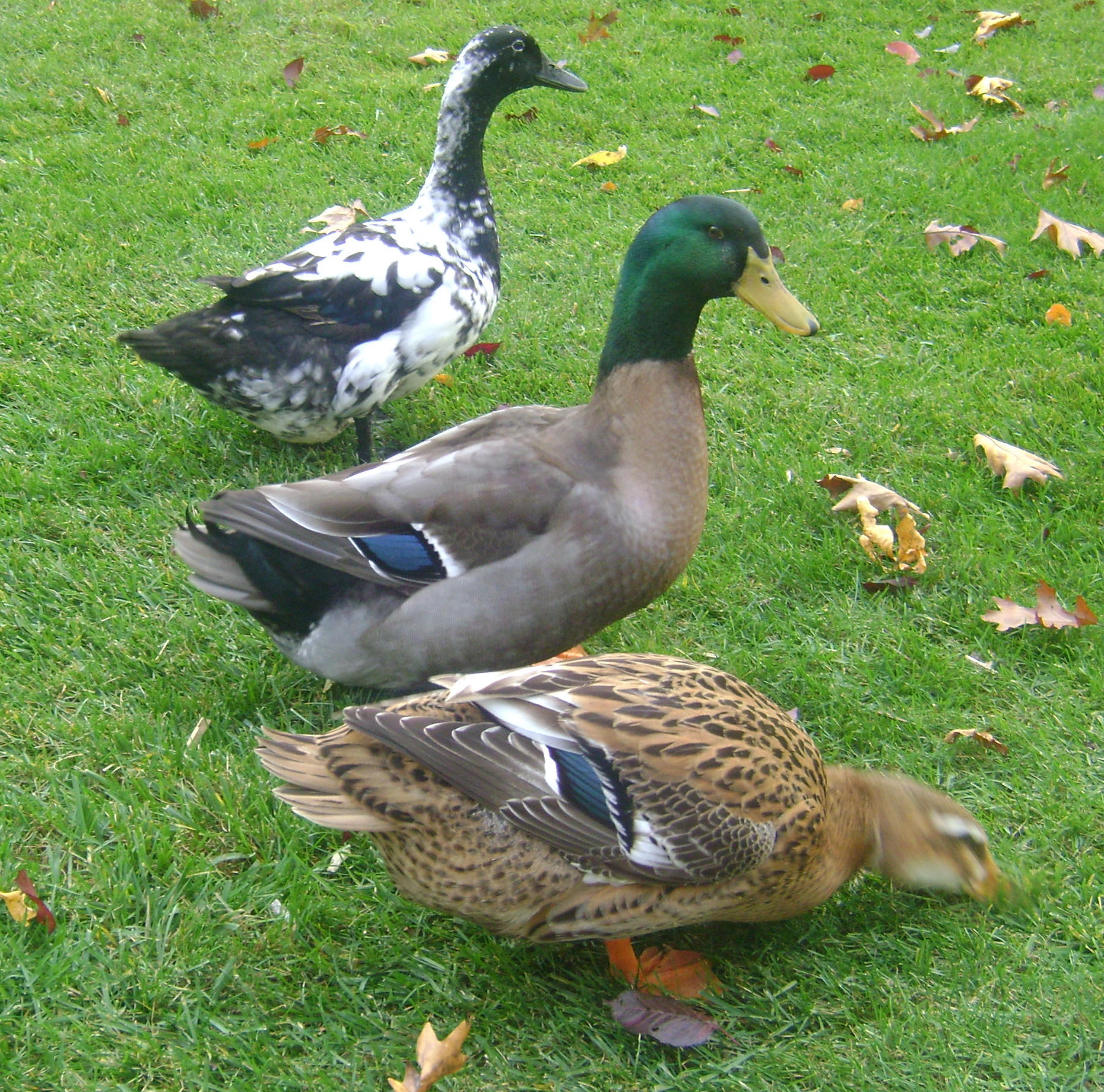 We
have a family in Connecticut who has three ducks
(one male Towie and two females Millie
and Gretta) in need of a new home.
We
have a family in Connecticut who has three ducks
(one male Towie and two females Millie
and Gretta) in need of a new home.
Gretta (originally named Jemma when at Majestic) is a black & white Cayuga duck who was adopted from us as a companion for their two Rouen ducks. The family needs to move in the spring and cannot take their ducks with them.
If we can't find a home for all three ducks, then Gretta will have to leave her two friends and come back to Majestic as part of her adoption agreement.
If you are interested in adopting these ducks, please complete our online Adoption Application, so we can properly screen your home. Gretta will be a Majestic adoption with an adoption guarantee in place, but the other two ducks will not be considered Majestic adoptions. There will be no adoption fee involved for any of the ducks.
The family is willing to drive a pretty good distance to bring the ducks to a loving family. If you're unsure if you are within that distance, please Email us and we'll inquire for you. Their new home must have a predator proof pen and safe night time house. No free range homes please!


